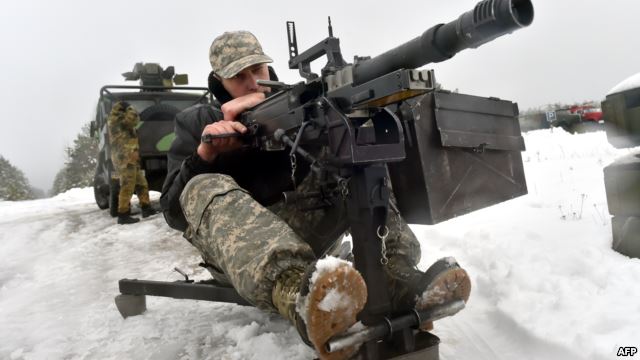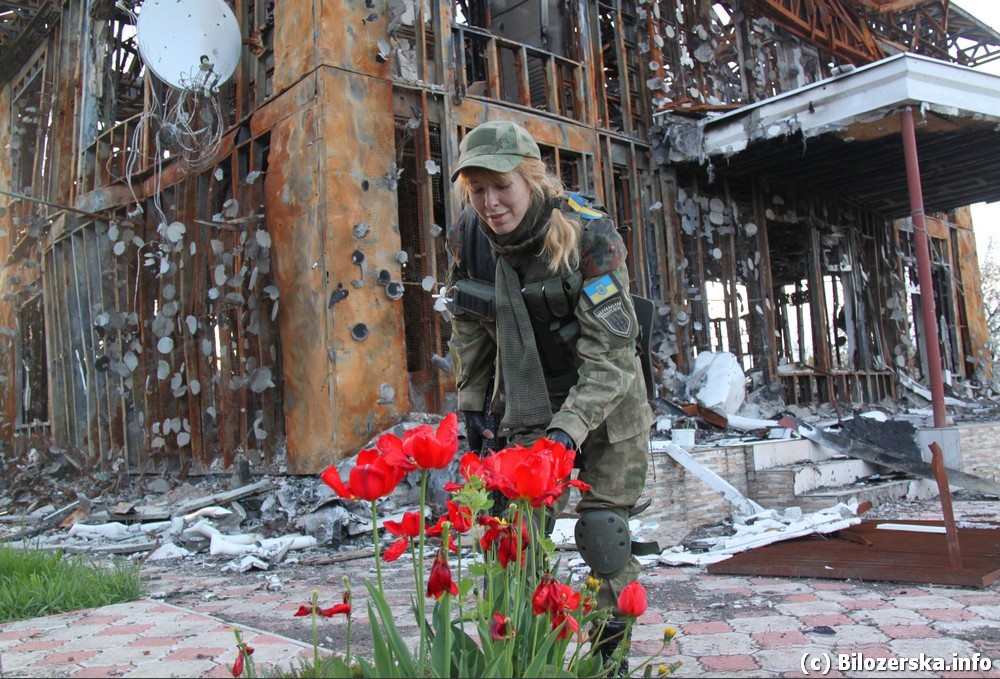the city is full of Russian soldiers
In a series of Tweets today, German MP and member of the Parliamentary Assembly of the Council of Europe (PACE) Marieluise Beck described the Russian occupation in Luhansk as she saw it – and the ominous signs of its potential annexation.
Occupation & infrastructure
In the messages, Beck says that the city is "full of Russian soldiers," and that an engineering brigade has already begun the reconstruction of infrastructure, including electrical lines, to Russia.
and thousands of troops have been seen in the region in recent days.
Russian President Vladimir Putin has already called for discussions on the region's "statehood" and Russian-installed officials have announced bilateral negotiations with Moscow “at the highest level” over the supply of Russian gas to occupied territory via a Luhansk pipeline. Such negotiations bypassing Kyiv would confer de facto recognition of southern Luhansk as being independent from Ukraine.
“In Moscow we have discussed the issues concerning the heating season and gas. We have a separate pipeline and we were guaranteed to receive gas supplies. The pipeline comes into the Luhansk region and covers the Donetsk region. We are the only two regions that in general do not rely on Ukraine,” Leonid Baranov, the Donetsk Republic's so-called "Minister of State Security" told Russian media.
Russian passports
Mirroring Crimea, Beck also confirms that Russian passports are already being handed out in the city, and that Russian soldiers are distributing to locals cash sums of Russian currency.
After the Russian-Georgian ceasefire, Russian-backed police in South Ossetia forced ethnic Georgians to accept Russian passports or leave, amounting to ethnic cleansing
.
“Russian authorities have launched the full-scale issuing of Russian passports in Donetsk and Luhansk. It is being done to give Russia an excuse to bring in the Russian Army under the pretext of protecting Russian citizens," said Yuriy Serhiyev, Ambassador of Ukraine to the United Nations yesterday.
Ominous similarities
Since signing a ceasefire agreement with Georgia two weeks ago, the Russian military and its local allies have carved a substantial buffer zone around the tiny enclave. To consolidate its latest conquests, Moscow has shipped in what Georgian officials describe as "industrial batches" of passports.
"The Russians are telling everyone in the town they must take a Russian passport," said Akhalgori shopowner Guram Chkhvidze. "One came to me and explained that if I did not take it, my safety could not be certain. I was scared, so I am leaving."
The Telegraph, August 30, 2008
Linguistic and religious Russification
Russification has also begun in the school system, with Beck also informing that lessons are already being conducted with Russian school textbooks; the curriculum change to that of the Russian Federation was verified by the OSCE Special Monitoring Mission. In Crimea, the Ukrainian language was summarily banned
from schools by Russia.
"The Ukrainian church and the mosque in Luhansk have been closed. The Ukrainian-Orthodox priests had to flee," read another tweet by the German MP observer.
Sectarian violence and religious persecution has been widespread during the conflict, with pro-Russian separatists considering Christian denominations such as the Ukrainian Orthodox Church of the Kyivan Patriarchate, Ukrainian Greek Catholic Church, Roman Catholics, and Protestants, as anti-Russian and see them as obstacles in the path of the separatist goal of uniting the region with Russia.
Previously during the occupation and annexation of Crimea by Russian forces, Ukrainian Catholics were forced to flee the peninsula under threat of arrest and property seizures. "All my parishioners are patriotic Ukrainians who love their Crimean homeland. But Russia is now seeking to drive us out," Father Milchakovskyi told the Catholic News Service in April. The Ukrainian Catholic Church was banned under the Moscow regime from 1946 to 1989, resulting in many clergymen arrested and Church property appropriated by the state and Russian Church.
New Russia or Novorossiya, Russia's name for the occupied parcels of the Donetsk and Luhansk oblasts, has already embedded in its constitution that it will act as a monolingual Russian state, with the Russian Orthodox Church and Russian Orthodoxy acting as the official state religion.
What next?
This story will develop in the coming days with a Tuesday press conference already scheduled by Russian-installed officials. The ongoing ceasefire may just be the calm needed to begin the process of solidifying Russian hegemony in the region, as occurred in Georgia. It remains to be see what form of annexation will take place: be it the formal annexation of Luhansk and neighboring Donetsk, facilitating their recognition as vassal states in the model of Abkhazia and South Ossetia, or unofficial recognition as Russia maintains with Transnistria.





